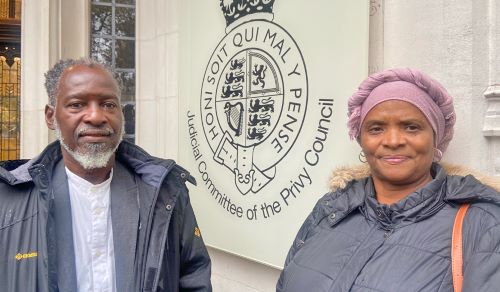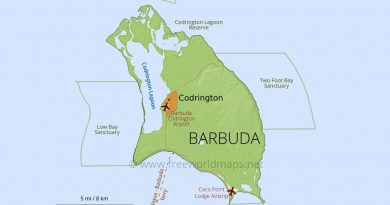Privy Council rules that Mussington and Frank do have standing in claim against Barbuda airport runway
Barbudans everywhere are celebrating today, Tuesday, February 27,
as two of their activists have won their appeal at the Privy Council.
Barbuda Councilman John Mussington and fellow resident Jacklyn
Frank had challenged the Browne Administration on the
construction of an international airport runway in a sensitive
location on the sister-island.
After the Eastern Caribbean Supreme Court of Appeal ruled that
they lacked the standing to bring a claim, Mussington and Frank
decided to take their matter to the Privy Council.
In the Council’s 22-page ruling, delivered at 7 a.m. local time today,
the five law lords disagreed with the ruling of the lower courts.
According to the Board, it “is satisfied that the appellants have
demonstrated sufficient interest in the environmental issues and the
breaches of the 2003 Act raised by the application for the
development permit.”
Of particular note to the law lords was that “Mussington’s scientific
background, his knowledge of the flora and fauna in the area, his
status as a local resident, and his experience of conducting
environmental assessments amply demonstrate a sufficient interest
in the subject matter of the application for judicial review.”
The Privy Council also noted that the Court of Appeal had erred in
taking too narrow an approach to the issue of “standing.”
Accordingly, the Privy Council says the Appeal Court had been
wrong to dismiss the case of Walton v Scottish Ministers as having
no relevance to the proper interpretation of CPR r 56.2.
According to the final court, Barbuda is a small island, and both
Mussington and Frank live in the village of Codrington, which is
about two kilometres from the airport and not far from the end of
the runway.
The law lords say the airport is going to result in air traffic with
“attendant noise, general disruption and environmental damage,
which is an issue of concern arising from the Brosnan report in
respect of hydrogeology.”
The issue of hydrogeology had been raised by Mussington after his
visit to the airport site in November 2017.
The Council agrees that there is a possibility that drinking water
might be affected by the airstrip’s operation, and this could present
a serious concern to residents on Barbuda.
These issues clearly demonstrate that both appellants are
substantially affected, the court has ruled.
The court also concluded that sufficient interest also arises from the
failures of the relevant authorities to follow due process.
Construction began without a development permit, contrary to
Section 17 of the Physical Planning Act, 2003, and the applications
reportedly had not been publicized – making it impossible for
persons to have the opportunity to comment or make
representation.
Critically, the Privy Council also ruled that in situations where an
application for judicial review involves issues of environmental
concern, it is not necessary for the applicant to demonstrate
expertise in the subject matter.
“All that is required is that they demonstrate some knowledge or
concern for the subject,” the court says.
Finally, the Government is accused of not living up to its obligations
under international treaties to which it is a signatory.
According to the Council, “Such an approach is consistent with
Antigua and Barbuda’s obligations … under the ‘Regional Agreement
on Access to Information, Public Participation and Justice in
Environmental Matters in Latin America and the Caribbean,’”–
better known as the Escazú Agreement.
Ironically, this country was the first to sign the agreement on
September 27, 2018, and it was ratified on March 4, 2020.




